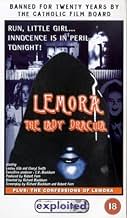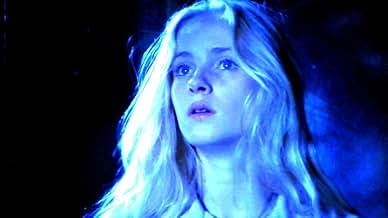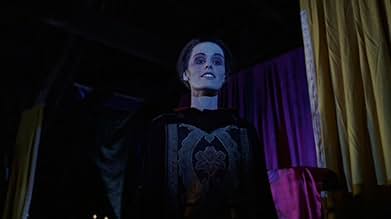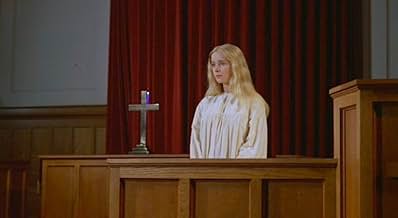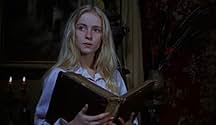NOTE IMDb
6,1/10
2,7 k
MA NOTE
Ajouter une intrigue dans votre langueA young girl who returns to her hometown to see her dying father finds herself being drawn into a web of vampirism and witchcraft.A young girl who returns to her hometown to see her dying father finds herself being drawn into a web of vampirism and witchcraft.A young girl who returns to her hometown to see her dying father finds herself being drawn into a web of vampirism and witchcraft.
- Réalisation
- Scénario
- Casting principal
Avis à la une
6sol-
A dark, atmospheric little film, it is quite bizarre and intriguing to watch, with shadow enhancing lighting, flashy colours, great sets, and a fine lead performance by Cheryl Smith, who is a perfect choice to play an innocent uncorrupted. On the other hand, the writer-director gives off a somewhat restrained performance as a priest, and towards the end, the film heads off into rather messy territory, with excesses of horror and too many slow motion, plus it takes forever to wrap the story up. There are some interesting ideas at hand, and a few worthwhile production elements, but overall this is a film that is much more so interesting than it is great.
Never had heard of this one before, and I assumed it would just be a low-budget snoozer - but it's not! It's pretty damn good! Angelic girl leaves her church to find her murderous dad so she can forgive him and finds herself involved with vampires instead. Very well shot and quite creepy. This deserves more attention. Plenty of tension; it feels like there's something supernatural and terrifying around every corner. Cheryl Smith made her debut here - she would later adopt the professional nickname Rainbeaux and briefly play with the Runaways band.
Modern audiences may be a little put off by this movie at first glance - just on account of its fairly low production values - but it's definitely superior to most films of its kind, although it's such a unique oddity it's hard to compare it with anything else. Lemora plays more like a dark fairy tale than a horror movie and I actually found it to be thoughtful and moving when I watched it through to the end. Atmosphere, a great story, and a likable and sympathetic protagonist are what make this movie work.
Lemora has got a southern Gothic setting, and it takes place in the 1930's, which gives the film something of the feel of the weird fiction pulp magazines that were prevalent during that time. However, in contrast to most of those tales, the main character in Lemora is a thirteen-year old girl, which gives the movie a sexual/lost innocence subtext in addition to the 'ancient horror' themes that are typical of that tradition.
Lila Lee is an angelic-looking church singer, who we learn is also the daughter of a murdering gangster. Upon receiving a letter from her estranged father (who is now apparently very ill), she sets out on a journey to reunite with him. Every male character she encounters comes across as a leering predator, with the exception of her guardian, the Reverend, who is a good man struggling with his desires to possess the young girl.
Once she leaves for Asteroth, there is no turning back for Lila, as it becomes more and more clear that no matter what should befall her on her journey, she will never be the same singing angel that she once was. And her future looks pretty grim. Stranded in a horrific swampland, she is pursued by its gruesome inhabitants - men who have degenerated into a pack of diseased and squealing brutes - into the domain of a mysterious vampire and her group of immortal warlocks. Cheryl Smith was perfect for this as Lila - her looks and expression throughout conveying Lila's fear and confusion and innocent faith and her longing for someone she can trust; if you can't believe in her, or Leslie Glib as the dark title character, the movie fails, but they pull it off wonderfully. I found the score and songs that were used in Lemora to be strangely moving and the sound effects were often genuinely creepy.
From what I've read, this movie got into some trouble with the church upon it's release and I think it was placed on a list of banned films or something. But, I think that the theme of Lemora would have to be badly misconstrued for it to be seen as offensive in the way that its detractors would probably suggest. There is really nothing polemical or anti-Christian about it that I could see; and the movie treats its devout characters with affection and understanding as they struggle with themselves and the darkness that surrounds them. The ending, while not upbeat, is consistent and honest and makes you feel something. And leaves you thinking.
I own the great-looking DVD of Lemora, and the Synapse company did a terrific job with this movie. It was released in late 2004, with a dedication to the memory of Cheryl Smith, who passed away in 2002. I remember seeing her name (appearing as Cheryl Rainbeaux Smith) in association with a lot of drive-in type horror movies and teen sex comedies, but for years she was just a semi-familiar name to me. But within the last couple years I happened to see Caged Heat and Laserblast again, and came away thinking that there was something unique about this actress. Her presence was always natural and uncontrived, with a sad vulnerability in her eyes and a dreaminess about her that seemed to come from some place beyond this earth.
I was a young child in the 70s when these movies, like Lemora, were released. The adult content of many of the drive-in films of that era obviously kept me from seeing them when they first came out, but I enjoy going back and watching them now, and I've always found the feel and style of that pre-blockbuster period to be oddly creative and interesting. But it also may be that I feel a lot of nostalgia for those naive and carefree times in my own life, when I would have had a small boy's crush on a blonde-haired starlet like Cheryl Smith. I'm not sure I remember seeing any of Cheryl's movies when I was young, but in some way I associate her with a lot of the joy and fascination of those times. I imagine that many other people do too.
Lemora has got a southern Gothic setting, and it takes place in the 1930's, which gives the film something of the feel of the weird fiction pulp magazines that were prevalent during that time. However, in contrast to most of those tales, the main character in Lemora is a thirteen-year old girl, which gives the movie a sexual/lost innocence subtext in addition to the 'ancient horror' themes that are typical of that tradition.
Lila Lee is an angelic-looking church singer, who we learn is also the daughter of a murdering gangster. Upon receiving a letter from her estranged father (who is now apparently very ill), she sets out on a journey to reunite with him. Every male character she encounters comes across as a leering predator, with the exception of her guardian, the Reverend, who is a good man struggling with his desires to possess the young girl.
Once she leaves for Asteroth, there is no turning back for Lila, as it becomes more and more clear that no matter what should befall her on her journey, she will never be the same singing angel that she once was. And her future looks pretty grim. Stranded in a horrific swampland, she is pursued by its gruesome inhabitants - men who have degenerated into a pack of diseased and squealing brutes - into the domain of a mysterious vampire and her group of immortal warlocks. Cheryl Smith was perfect for this as Lila - her looks and expression throughout conveying Lila's fear and confusion and innocent faith and her longing for someone she can trust; if you can't believe in her, or Leslie Glib as the dark title character, the movie fails, but they pull it off wonderfully. I found the score and songs that were used in Lemora to be strangely moving and the sound effects were often genuinely creepy.
From what I've read, this movie got into some trouble with the church upon it's release and I think it was placed on a list of banned films or something. But, I think that the theme of Lemora would have to be badly misconstrued for it to be seen as offensive in the way that its detractors would probably suggest. There is really nothing polemical or anti-Christian about it that I could see; and the movie treats its devout characters with affection and understanding as they struggle with themselves and the darkness that surrounds them. The ending, while not upbeat, is consistent and honest and makes you feel something. And leaves you thinking.
I own the great-looking DVD of Lemora, and the Synapse company did a terrific job with this movie. It was released in late 2004, with a dedication to the memory of Cheryl Smith, who passed away in 2002. I remember seeing her name (appearing as Cheryl Rainbeaux Smith) in association with a lot of drive-in type horror movies and teen sex comedies, but for years she was just a semi-familiar name to me. But within the last couple years I happened to see Caged Heat and Laserblast again, and came away thinking that there was something unique about this actress. Her presence was always natural and uncontrived, with a sad vulnerability in her eyes and a dreaminess about her that seemed to come from some place beyond this earth.
I was a young child in the 70s when these movies, like Lemora, were released. The adult content of many of the drive-in films of that era obviously kept me from seeing them when they first came out, but I enjoy going back and watching them now, and I've always found the feel and style of that pre-blockbuster period to be oddly creative and interesting. But it also may be that I feel a lot of nostalgia for those naive and carefree times in my own life, when I would have had a small boy's crush on a blonde-haired starlet like Cheryl Smith. I'm not sure I remember seeing any of Cheryl's movies when I was young, but in some way I associate her with a lot of the joy and fascination of those times. I imagine that many other people do too.
This highlight of seventies horror cinema is a vibrant and lush Gothic fairytale story of a young girl's odyssey as she searches for her father in a world of vampires and demons that wont hesitate to take her innocence at any opportunity that they get. Richard Blackburn's film takes influence from a number of sources across both film and literature, but in spite of this; the writer-director has managed to mould together a tale that is both haunting and original. The story follows Lila Lee, the daughter of a notorious gangster who, after finding his wife in bed with another man, proceeds in blowing both her and her lover to bits. Shortly after her father had fled the town to avoid the law, Lila Lee receives a letter telling her that her father is on his deathbed and wants her to come and see him. Only thing is, this letter is signed 'Lemora'. The film plays out like an offbeat coming of age drama, with the innocent young Lila Lee learning that all is not as it seems, and that danger lurks around every corner. The supernatural elements serve brilliantly as a metaphor for the similar dangers in real life.
The acting in Lemora clearly isn't the most important aspect of the film, but there are still some notable performances on display. Cheryl Smith takes the lead role as the angelic Lila Lee, and completely looks the part as a bewildered young girl in the centre of a world she knows nothing about. The title role of 'Lemora' is taken by Lesley Gilb. This actress doesn't have a film credit to her name after this film, and it's not really surprising as despite looking the part; her performance is wooden in the extreme. Writer-director Richard Blackburn is surprisingly effective in his small role as a reverend. He completely convinces as the odd god fearing preacher. Really, though, it's the more aesthetic elements of the film that rule; and the atmosphere and the make-up are absolutely excellent. The nighttime filming helps to create a sense of danger at every turn, and brilliantly compliments the fear that the child at the centre of the story is feeling. The make-up is effectively done, but not overdone; which makes the monsters feel very real despite their otherwise otherworldly appearance. Lemora, despite it's low budget and inexperienced crew, is a surprisingly professionally done film. While most films released at this point in time relied on high body counts and gore levels to draw audiences; Richard Blackburn has put the focus on story and atmosphere, and that is why Lemora is the enduring, albeit lost, classic that it is today.
The acting in Lemora clearly isn't the most important aspect of the film, but there are still some notable performances on display. Cheryl Smith takes the lead role as the angelic Lila Lee, and completely looks the part as a bewildered young girl in the centre of a world she knows nothing about. The title role of 'Lemora' is taken by Lesley Gilb. This actress doesn't have a film credit to her name after this film, and it's not really surprising as despite looking the part; her performance is wooden in the extreme. Writer-director Richard Blackburn is surprisingly effective in his small role as a reverend. He completely convinces as the odd god fearing preacher. Really, though, it's the more aesthetic elements of the film that rule; and the atmosphere and the make-up are absolutely excellent. The nighttime filming helps to create a sense of danger at every turn, and brilliantly compliments the fear that the child at the centre of the story is feeling. The make-up is effectively done, but not overdone; which makes the monsters feel very real despite their otherwise otherworldly appearance. Lemora, despite it's low budget and inexperienced crew, is a surprisingly professionally done film. While most films released at this point in time relied on high body counts and gore levels to draw audiences; Richard Blackburn has put the focus on story and atmosphere, and that is why Lemora is the enduring, albeit lost, classic that it is today.
10norfaust
I first read about this obscure 70s vampire flick a couple of years back, in one of my numerous reference books on hard-to-find films. Having never heard of director Richard Blackburn at the time and being a fan of the more exotic and offbeat in cinema (not to mention that I was extremely keen on seeing the film), I decided to try to locate it on VHS. Unfortunately this would turn out to be an almost impossible task (as with most films of this kind), and I soon grew disillusioned and frustrated, recognizing the sad fact that I would probably never even get to see the film. Luckily this would soon change: A few weeks back I was lucky enough to come across a rare Greek pre-record/ex rental tape of the film, and, not hesitating for a moment, I bought it. Needless to say, this was a decision I have NEVER regretted since!!
The reasons for this are simple: "Lemora" (aka: Lemora-Lady vampire, The legendary curse of Lemora) is doubtless one of the best horror films I´ve seen in years, a classic that deserves to be right up there with "Night of the living dead", "The exorcist" and "Evil dead". First time director Richard Blackburn creates a chilling and highly original supernatural tale of religious anxiety, repressed sexuality and initiation, a debut film that leaves a lasting impression on both the hearts and minds of anyone lucky enough to see it.
Plotwise, the film follows a young Christian girl (Lila Lee, portrayed by Cheryl Smith), the daughter of a wanted gangster, who leaves her home town to visit her father on the death bed. As it turns out this is all a set up, and Lila soon finds herself under the spell of a female vampire called Lemora. She is the leader of some sort of religious cult in a small village deep into the woods and she plans to initiate the young girl in the cult´s activities. The young girl, sensing that something is wrong, flees from Lemora´s grasp and tries to find a way out of the labyrinthine woods. But will she make it?
Overall this is a beautiful, poetic and hauntingly surreal adult fairy tale, the horror film equivalent of "Little Red Riding Hood" (though with some modifications). Although shot on a very low budget, the film manages to overcome all its budgetary constraints and deliver a final product with more (emotional) impact than a dozen modern horror films combined. The film is genuinely creepy and atmospheric, with an almost Gothic flavour reminiscent of Hammer and Benjamin Clark & Alan Ormsby´s "Children shouldn´t play with dead things". The performances are all excellent, and the make-up & gore effects are surprisingly good, adding to the creepiness of the story. Add to all this a charismatic lead (Lemora, convincingly played by Lesley Gilb) and you have all the characteristics of a cult classic; A unique, mesmerizing film experience full of "primitive" energy, a film where you find yourself drawn into a mysterious world, yet where you can´t really describe why the film appeals to you.
What most viewers have either failed to recognize or not bothered to comment on though, is the fact that there is so much more to this film than meets the eye. Underneath the surface this intelligent & well written little low budget gem is a complex allegory (or parable if you will) concerned with questions of faith, the process of growing up and the duality of man. The whole film is one long symbolic journey, an odyssey, into the darkness of man´s heart; A journey from childhood to adolescence (leaving the childhood illusions and facing the real world), from oppression and self-deception to freedom and self-recognition. The main character leaves her safe, protected & idyllic sanctuary (church/local community), and stumbles into a frightening and nightmarish world of violence, darkness, death and lust. One the way she encounters numerous dangers and temptations (she succumbs to many of them), and she gradually changes from a young, innocent beauty with little knowledge of the world, to a mature woman who has both seen and felt death. Throughout the journey her believes are questioned, and one by one her pietistic fears are taken form her, as she finally recognizes her true nature (from which there is no escape). The characters, as well as the setting, all have a symbolic function and significance; The young, pristine girl (symbolically dressed in white; Innocence), the vile, savage, beast-like creatures out in the woods (man´s uncontrollable primal urges, sexuality, the beast in man), and Lemora (forbidden knowledge, freedom, breaking free of chains, immortality). Yes, Lemora probably symbolizes everything we do not want to face, the darkness deep inside of us.
As for themes, the film is concerned with religious hypocrisy, the breaking of taboos (sexual and others), good vs. evil, light vs. darkness, sin, and most importantly of all, recognizing the darkness within ourselves (an aspect of man that Christianity refuses to accept and for centuries has tried to suppress). The film does not draw any conclusions though, and the ending, which is both ambivalent and a bit confusing, leaves one to ponder. Did it all just happen in the young girl´s mind, and is this a film that criticizes religion as narrow-minded and suppressive or that embraces it? Personally I feel it´s the former, but some of you may disagree.
Anyway, this film comes highly recommended!! Any serious horror fan should seek out this classic at once (you´ll probably have a hard time locating it though!) And if you ask me: It´s definitely about time that this horror masterpiece gets a DVD release (Anchor Bay, please read this!!).
The reasons for this are simple: "Lemora" (aka: Lemora-Lady vampire, The legendary curse of Lemora) is doubtless one of the best horror films I´ve seen in years, a classic that deserves to be right up there with "Night of the living dead", "The exorcist" and "Evil dead". First time director Richard Blackburn creates a chilling and highly original supernatural tale of religious anxiety, repressed sexuality and initiation, a debut film that leaves a lasting impression on both the hearts and minds of anyone lucky enough to see it.
Plotwise, the film follows a young Christian girl (Lila Lee, portrayed by Cheryl Smith), the daughter of a wanted gangster, who leaves her home town to visit her father on the death bed. As it turns out this is all a set up, and Lila soon finds herself under the spell of a female vampire called Lemora. She is the leader of some sort of religious cult in a small village deep into the woods and she plans to initiate the young girl in the cult´s activities. The young girl, sensing that something is wrong, flees from Lemora´s grasp and tries to find a way out of the labyrinthine woods. But will she make it?
Overall this is a beautiful, poetic and hauntingly surreal adult fairy tale, the horror film equivalent of "Little Red Riding Hood" (though with some modifications). Although shot on a very low budget, the film manages to overcome all its budgetary constraints and deliver a final product with more (emotional) impact than a dozen modern horror films combined. The film is genuinely creepy and atmospheric, with an almost Gothic flavour reminiscent of Hammer and Benjamin Clark & Alan Ormsby´s "Children shouldn´t play with dead things". The performances are all excellent, and the make-up & gore effects are surprisingly good, adding to the creepiness of the story. Add to all this a charismatic lead (Lemora, convincingly played by Lesley Gilb) and you have all the characteristics of a cult classic; A unique, mesmerizing film experience full of "primitive" energy, a film where you find yourself drawn into a mysterious world, yet where you can´t really describe why the film appeals to you.
What most viewers have either failed to recognize or not bothered to comment on though, is the fact that there is so much more to this film than meets the eye. Underneath the surface this intelligent & well written little low budget gem is a complex allegory (or parable if you will) concerned with questions of faith, the process of growing up and the duality of man. The whole film is one long symbolic journey, an odyssey, into the darkness of man´s heart; A journey from childhood to adolescence (leaving the childhood illusions and facing the real world), from oppression and self-deception to freedom and self-recognition. The main character leaves her safe, protected & idyllic sanctuary (church/local community), and stumbles into a frightening and nightmarish world of violence, darkness, death and lust. One the way she encounters numerous dangers and temptations (she succumbs to many of them), and she gradually changes from a young, innocent beauty with little knowledge of the world, to a mature woman who has both seen and felt death. Throughout the journey her believes are questioned, and one by one her pietistic fears are taken form her, as she finally recognizes her true nature (from which there is no escape). The characters, as well as the setting, all have a symbolic function and significance; The young, pristine girl (symbolically dressed in white; Innocence), the vile, savage, beast-like creatures out in the woods (man´s uncontrollable primal urges, sexuality, the beast in man), and Lemora (forbidden knowledge, freedom, breaking free of chains, immortality). Yes, Lemora probably symbolizes everything we do not want to face, the darkness deep inside of us.
As for themes, the film is concerned with religious hypocrisy, the breaking of taboos (sexual and others), good vs. evil, light vs. darkness, sin, and most importantly of all, recognizing the darkness within ourselves (an aspect of man that Christianity refuses to accept and for centuries has tried to suppress). The film does not draw any conclusions though, and the ending, which is both ambivalent and a bit confusing, leaves one to ponder. Did it all just happen in the young girl´s mind, and is this a film that criticizes religion as narrow-minded and suppressive or that embraces it? Personally I feel it´s the former, but some of you may disagree.
Anyway, this film comes highly recommended!! Any serious horror fan should seek out this classic at once (you´ll probably have a hard time locating it though!) And if you ask me: It´s definitely about time that this horror masterpiece gets a DVD release (Anchor Bay, please read this!!).
Le saviez-vous
- AnecdotesNotably similar to the story Carmilla by Sheridan Le Fanu in which a female seduces a teenage girl. Towards the end of the film Lemora indicates that she has had many names.
- GaffesWhen Lila is first taken into the house by Lemora, she is told to go upstairs to her room. Lemora says "It is the first open door at the end of the hall." But when Lila goes upstairs ALL of the doors are closed.
- ConnexionsFeatured in Movie Macabre: Lemora A Child's Tale of the Supernatural (1983)
- Bandes originalesPaper Angel
Sung by The Black Whole
Meilleurs choix
Connectez-vous pour évaluer et suivre la liste de favoris afin de recevoir des recommandations personnalisées
- How long is Lemora: A Child's Tale of the Supernatural?Alimenté par Alexa
Détails
- Date de sortie
- Pays d’origine
- Langue
- Aussi connu sous le nom de
- Lemora: A Child's Tale of the Supernatural
- Lieux de tournage
- Phillips Mansion - 2640 W. Pomona Boulevard, Pomona, Californie, États-Unis(Lemora's house exteriors)
- Société de production
- Voir plus de crédits d'entreprise sur IMDbPro
Contribuer à cette page
Suggérer une modification ou ajouter du contenu manquant



